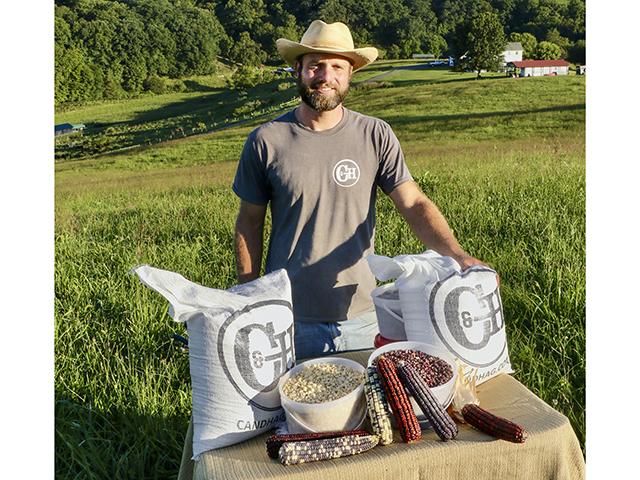Grow for the market
In growing these specialty corns, as well as wheat, barley, and rye, Carter is driven by finance, not ideology. Much of Southwest Virginia is removed from the plant marketing standpoint. Where he grew commodity corn, one of the nearest profitable markets is several hundred miles away in northeast Alabama.
Over the years Carter has tried several ventures – growing produce in greenhouses, pumpkins and ornamental “Indian corn”. He also sold whole or half beef from their herd. All of these ventures had limited success, but not the returns Carter, the only full-time employee, had hoped for.
“Originally, I wanted to raise cattle for the rest of my life,” explains Carter. “I still raise cattle, but the topography and size of the farm (300 acres of pasture, cornfields, and timber) limit the size needed for a full-time subsistence.”
In 2016, while Carter was still growing Indian corn, an acquaintance in nearby Lebanon, Virginia, who was opening a distillery, asked Carter about growing corn and other grains. The idea, both agreed, was to use Bloody Butcher and Hickory King White for their flavor profiles and local origins.
“We would grow heritage corn varieties in the region where they were developed,” says Carter. “Now our location is no longer an obstacle, but a marketing tool.”
IDENTIFY A MARKET
That was the beginning. This small business prompted him to look around the market to see what he could grow.
“By law, to be called bourbon, it has to be 51% corn,” Carter explains. “It seemed crazy that everyone would use the same raw material, corn. Shouldn’t there be more options?
“I realized I had no competitors and thought this was a good deal,” he continues. He would prepare postcards detailing the business and the grain he could supply, then mail them to distilleries and breweries located roughly along Interstates 81 and 26 in several states.
“I only got one answer, but it was a good one,” says Carter. North Georgia Still Co., based in Dahlonega, supplies the components that can be used for distilling nationwide. It turned out that their customers were also asking the company about sources of grain as feedstock. Now North Georgia Still customers can order ground grain from the company, and Carter fulfills the orders by shipping directly from his farm.
North Georgia Still remains one of Carter’s largest customers – along with craft distilleries in Chicago, Kentucky and Tennessee. It’s perhaps not surprising that after he dabbled in growing traditional varieties, Carter committed to growing his own corn to alleviate problems with low germination rates or plants whose height makes them more vulnerable to strong winds.
Rich Mountain and Sir Charles are two strains that Carter recently developed. He grew about 3 acres each year that year. “The germination rates were phenomenal compared to pure Bloody Butcher,” he says.
How available will these grains be in the industry? Limited, for now. Carter has received positive feedback from several distilleries and well-known moonlighters who have tested Rich Mountain and Sir Charles. However, he is considering starting his own local distillery that would use these grains for base materials and flavor profiles not available anywhere else in the country.
“If you’re the best at what you do, your geographic location doesn’t matter,” says Carter. “People will find you at this point.”
C&H SOLUTIONS: A RICH HERITAGE
In 1941, Drew Carter’s grandfather, KO Hartsock, became the first farmer in the area to become a member of the American Aberdeen-Angus Breeders’ Association, now the American Angus Association. He was one of the first farmers to bring Angus cattle to the Southwest Virginia/Northeast Tennessee region.
This legacy is part of the C&H Solutions LLC name, where the “H” stands for Hartsock. In recent years, her herd has consisted exclusively of Angus and numbered up to 140 head. The numbers were reduced as the heirloom corn business thrived, with a herd of about 60 with the registered animals separated from Carter’s commercial herd.
In the years since, Carter’s father, Roger Carter, has run two successful businesses, one of them mining supplies. Drew Carter has relied heavily on his father for business advice and support.
“My father taught me to treat everyone equally, whether customers are small or large,” says Carter. “Whether you’re a multi-million dollar distillery or a guy with a keg still in the garage, I’ll treat you exactly the same.”
**
FOR MORE INFORMATIONS
— To learn more about C&H Solutions’ corn, beef and product line, visit https://www.candhag.com/…
[PF_1022]
(c) Copyright 2022 DTN, LLC. All rights reserved.


Comments are closed.